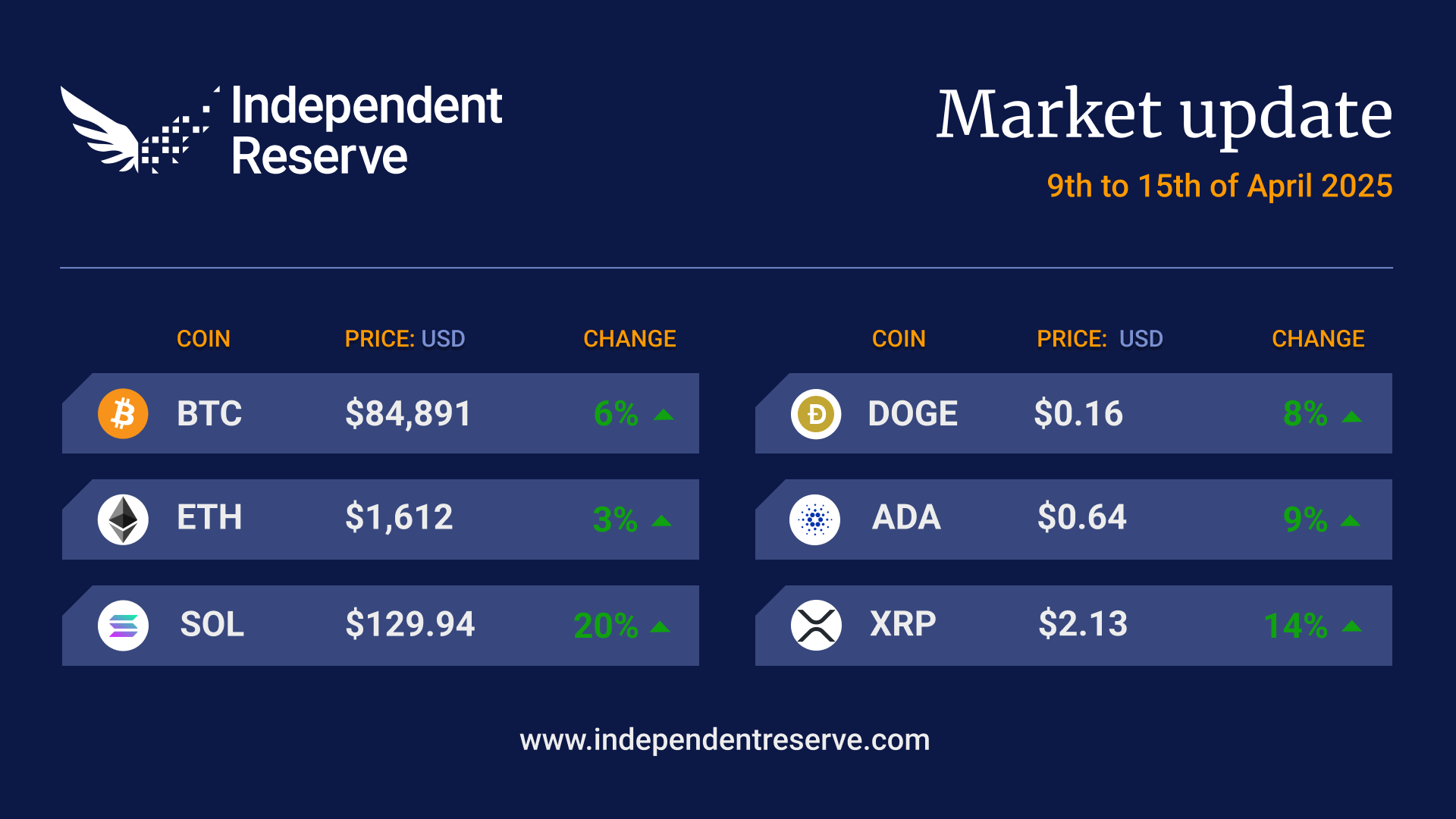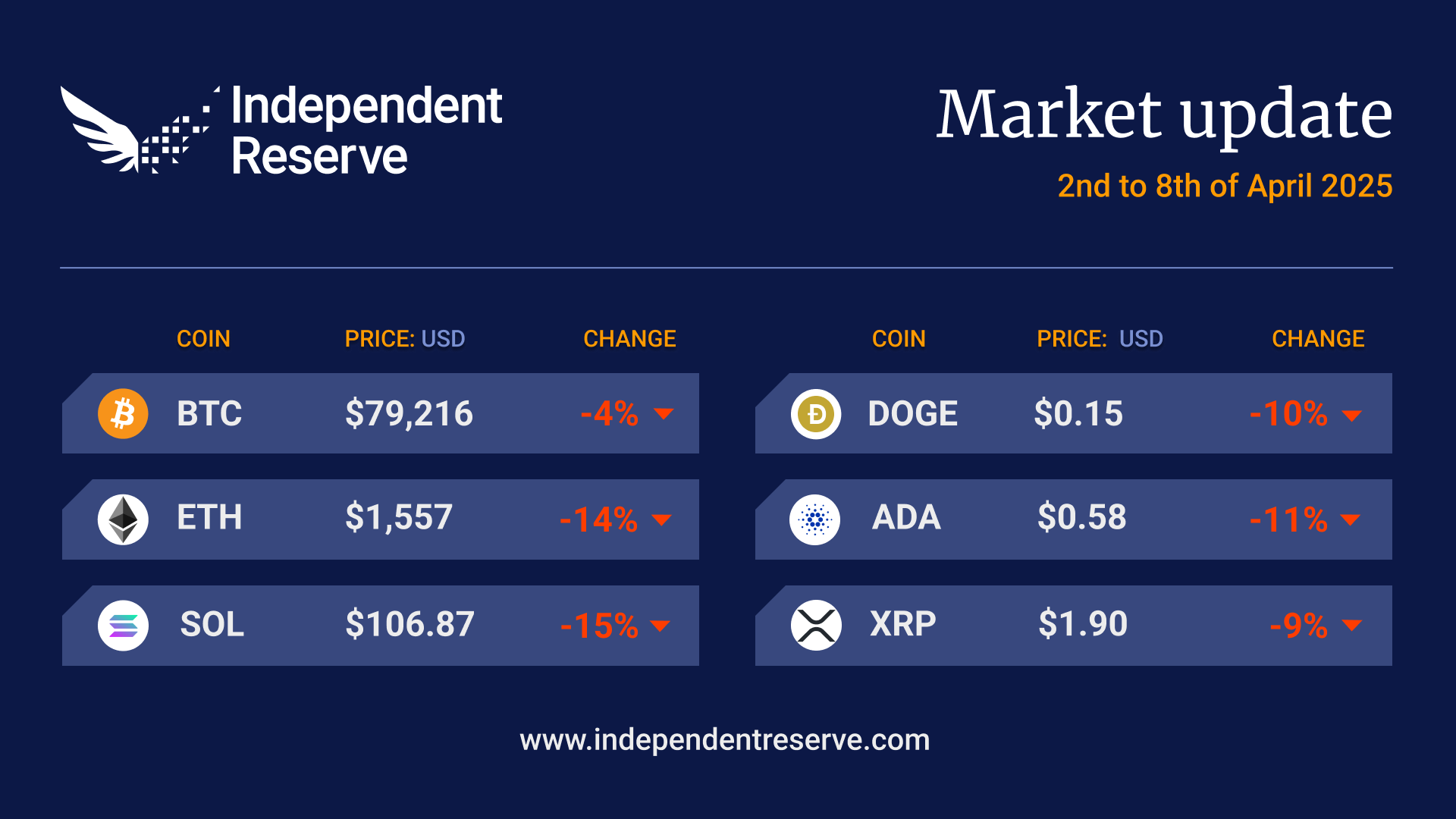In Markets
Despite new China ban FUD, the existing FUD about Evergrande, and the looming passage of the Infrastructure bill in the US Senate, Bitcoin has held up remarkably well (compared to where it started) and finished flat this week to trade around AU$58,150 (US$42.6K). BTC is also about 13.8% down on 30 days ago, but September is historically a poor month for returns. Ethereum was also flat, while Polkadot was down 1%, Ripple was up 1.6%, Cardano increased 3.5% and Uniswap was up 10.5%. The Crypto Fear and Greed Index is at 26, or Fear.
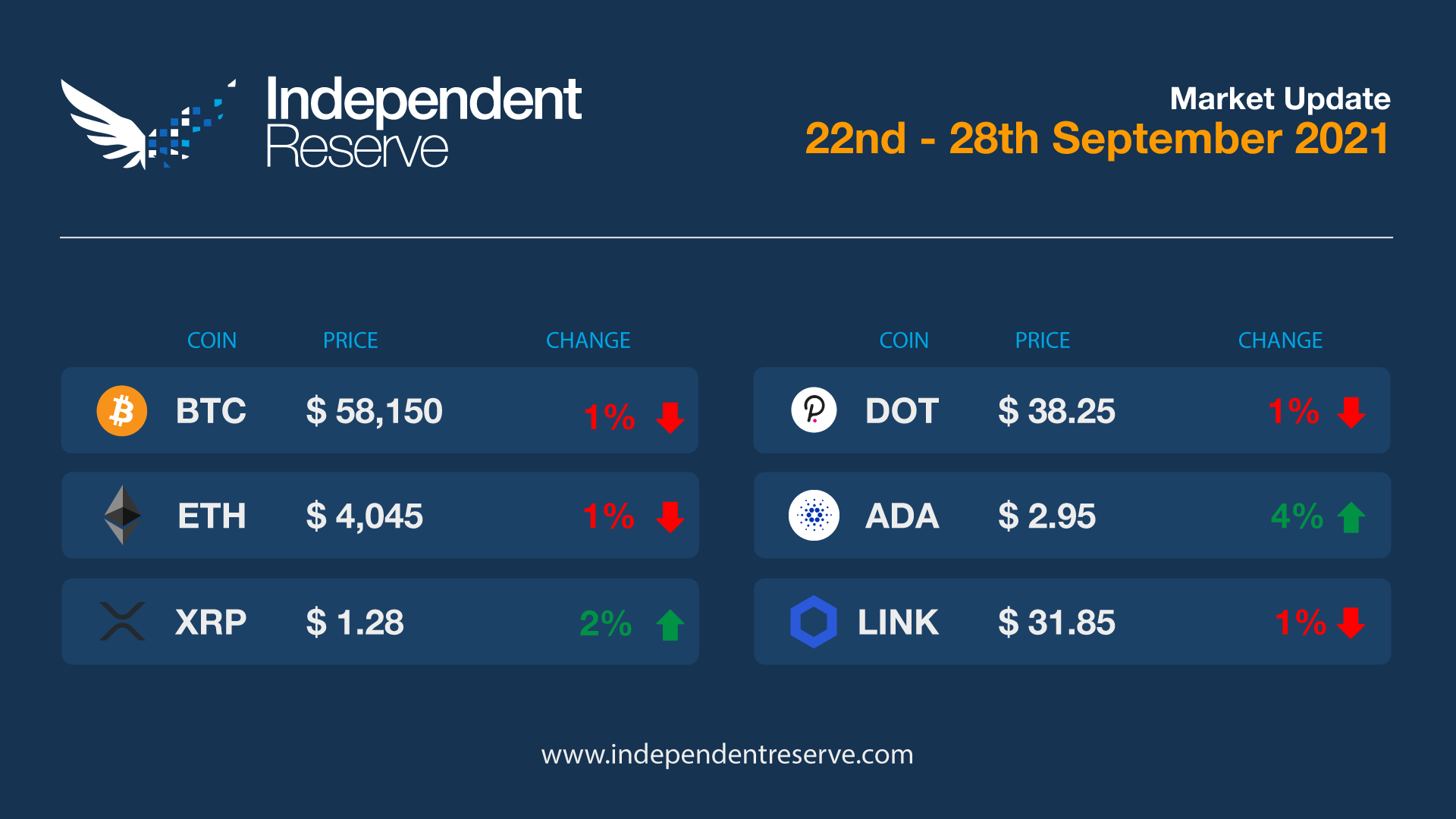
From the IR OTC Desk
The Q and A at last week’s FOMC meeting proved particularly interesting and highlighted the Federal Reserve’s view on a range of pressing topics.
1. The conditions to taper have most likely been met and that Governor Powell views the current stance of the economy as being further progressed in the recovery than when asset tapering previously occurred (employment data for September and October will remain key).
2. There isn’t a large amount of direct US exposure to Evergrande, and while it may affect confidence channels, it is more an onshore China issue only.
3. There are several streams of work occurring on a US Central Bank Digital Dollar (US CBDD). A consultation paper regarding this topic may be available from the Fed as soon as next month. Governor Powell stressed that it is important to weigh both sides of the equation (positives and negatives of a US CBDD), and that it will take time to get the framework and regulation correct if/when implementation were to occur.
On the OTC desk, we continue to see plenty of flow in stable coins. USDT traded below parity during the early part of last week, corresponding to the move wider in US commercial paper credit spreads. As the broader credit markets calmed on Wednesday, pricing then flipped to a premium – where we appear to have now stabilised. Opportunistic buying has remained in L1’s, albeit name specific. Technical trading in the majors remains light, with the challenges associated with navigating (short term) headline driven price action.
For any trading needs, please don’t hesitate to get in touch.
In Headlines
Infrastructure bill vote
The US Infrastructure bill is headed for a vote in the Senate this week. The crypto tax provisions in the bill, if passed unamended, would place onerous reporting requirements on everyone from validators to software developers. As of September 27, the bill has received 539 amendments. Separately Senators Maggie Hassan (D-NH) and Joni Ernst (R-IA) have introduced a bipartisan bill whose purpose is to get America up to speed with cryptocurrency regulations around the world before imposing any new regs locally.
New OCC nominee is anti-crypto AND anti-banks
The Biden administration is reportedly likely to tap Kazakhstani-American attorney, academic and former policy advisor Saule Omarova to head the Office of the Comptroller of the Currency. She is weirdly both anti crypto and anti big banks which suggests two things: one is that she won’t be friendly to crypto if she gets in and; two, she may not secure the nomination due to lobbying efforts by big banks.
China bans Bitcoin yet again
China seems to be banning Bitcoin twice a week these days, although the frequency of these announcements has led to them having progressively less impact on markets. In the latest salvo the central bank The People’s Bank of China has declared all crypto related activities are “strictly prohibited” in the country. It actually released the guidance on September 15 but finally posted it online late last week. Huobi has banned new users from China and will retire all mainland accounts by the end of the year while Binance claimed it doesn’t actually have any Chinese users… Pundits believe the move is likely a way for the PBOC to clear the decks of competition for its digital yuan, which is in the final stages of trials.
DeFi to the rescue?
Bitcoin and crypto markets more widely suffered a bit of volatility from the China news, but a new narrative quickly emerged. There were reports about Chinese social media users shifting en masse to DeFi platforms such as dYDx. The decentralised exchange has actually doubled Coinbase’s volume in recent days and DeFi coins including Uniswap, Sushi, FutureSwap and Curve saw big jumps.
Ether mining
Sparkpool mining pool, which accounts for around 21% of the Ethereum hash rate said it will end operations by September 30. Based in Hangzhou China, the second largest Ether mining pool after Ethermine stated it will be stopping services both “at home and abroad”. Meanwhile Alibaba has announced it will ban sales of crypto mining equipment.
Fat fingered intern strikes again
Someone, or possibly a rogue automated system, at Bitfinex managed to pay a US$23 million (AU$31.6M) gas fee for a 100,000 USDT transaction earlier today. This is a new record-breaking mistake, assuming that it is a mistake.
Wheel of fortune
If you’ve been trading crypto since June and failed to make more than 24% profits, then sadly you’ve been out-traded by a hamster. The German hamster named Mt Goxx makes trades by exercising on an ‘intention wheel’ to pick one of 30 coins and then runs down a ‘decision tube’ that denotes either buy or sell. He’s currently outperforming the S&P 500.
2.1M Salvadorans can’t be wrong
Meanwhile Salvadoran President Nayib Bukele (the ‘coolest dictator in the world’ according to his new Twitter bio) claims that 2.1 million locals are ‘actively using’ the Chivo Bitcoin wallet. Bukele says the wallet now has more users than any bank in the country and is on track to have more users than all the banks combined. The “active users” metrics is no doubt influenced by the US$30 (AU$41) in Bitcoin locals get for downloading the app, so it remains to be seen how active they’ll be after that money is gone. The total amount of Bitcoin locked in the Lightning Network has reached an all-time high of 2,738 BTC according to Glassnode.
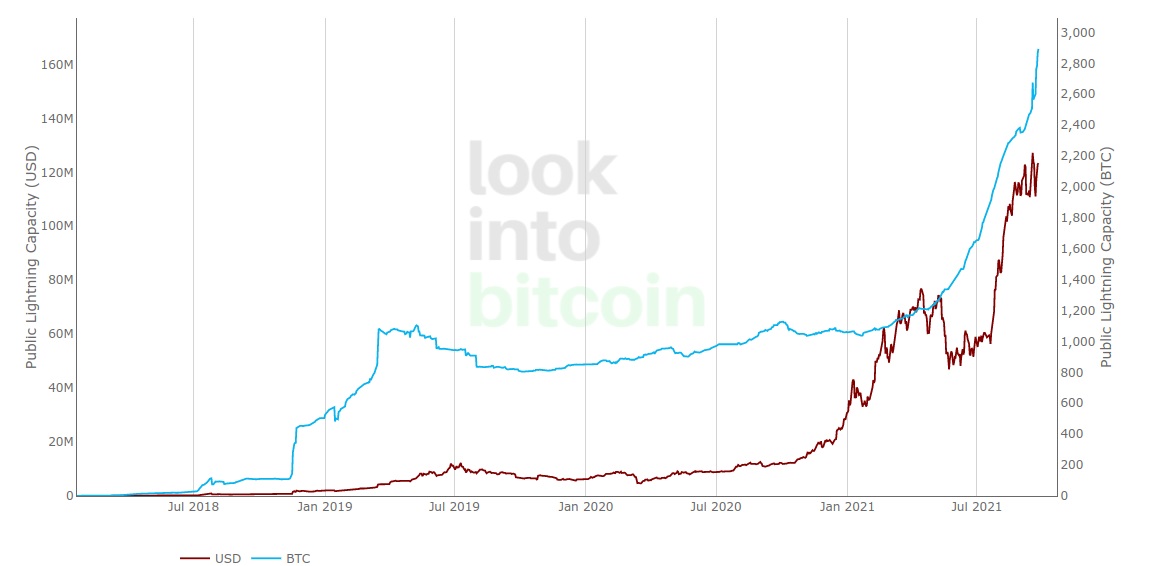
Bitcoin Lightning Network capacity vs. BTC/USD chart. Source: LookIntoBitcoin
Twitter’s lightning strike
While the latest China ban made headlines in mainstream outlets, only business outlets covered the potentially much more significant news that Twitter has integrated the Strike Bitcoin lightning wallet (only available in the US and El Salvador at the moment). Users are now able to send and receive Bitcoin for free as easily as sending a Tweet. Demonstrating the tech, hoodie-wearing CEO Jack Mallers from Strike made an instant payment from Chicago to San Salvador, asking “why would anyone ever use Western Union again?” Ark Invest was clearly impressed by the move, buying US$89M (AU$122M) more of Twitter shares that day, making Twitter its third largest holding out of 50 stocks.
Institutions eyeing Ether
According to a JPMorgan report issued on Wednesday, institutional investors are claimed to be increasing their exposure to Ether. Analysts have credited the ongoing growth in decentralised finance (DeFi) and non-fungible tokens (NFTs) as the key drivers behind the interest in Ethereum. In conjunction with this “strong divergence in demand”, record amounts of Ether are circulated out of exchanges as per data provided by CryptoQuant, with net reserves on exchanges dropping to 18.64 million ETH compared to 23.94 million 12 months ago.
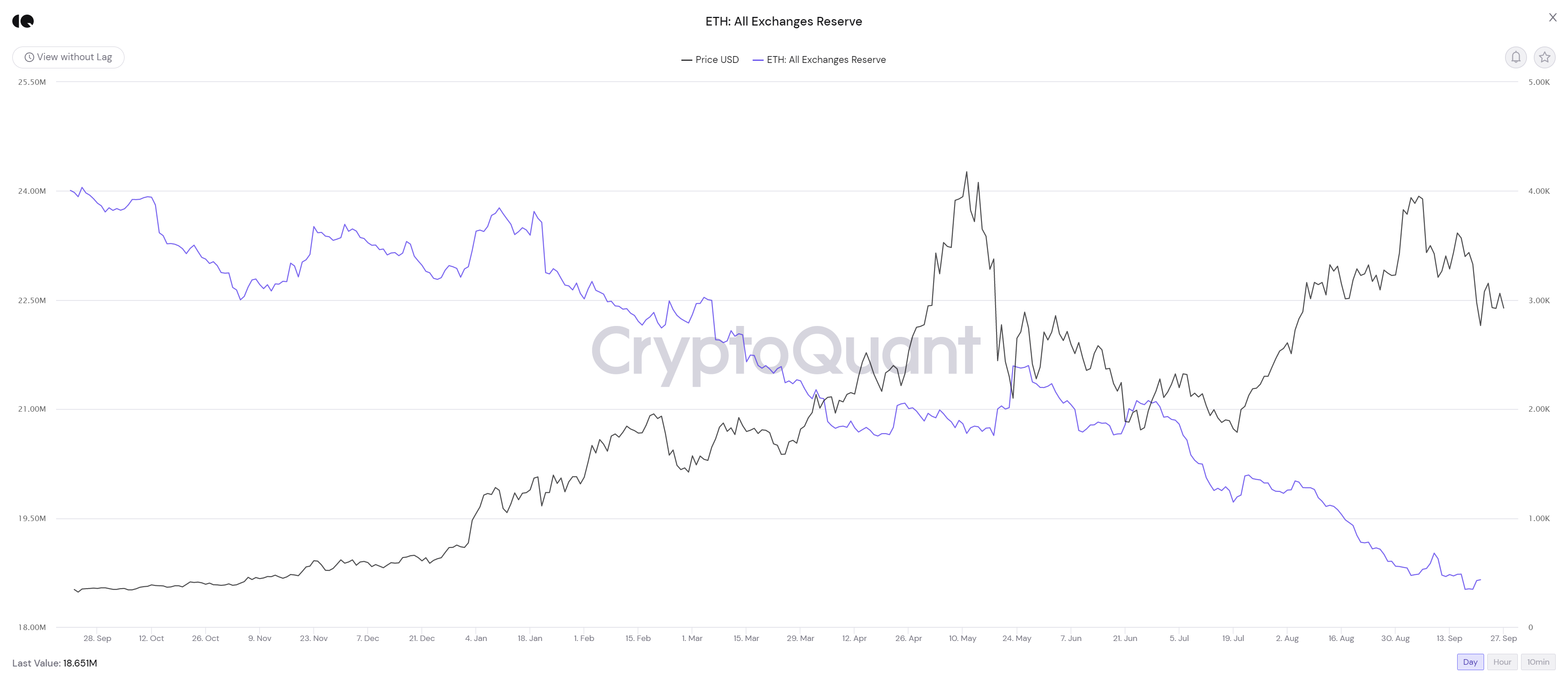
Amount of ETH held in exchange wallets vs. ETH/USD chart. Source: CryptoQuant
Fed CBDC progress
US Federal Reserve chairman Jerome Powell has shared progress on the FED’s work on the digital dollar. Revealing to CNBC on Wednesday that, “we are working proactively to evaluate whether to issue a CBDC and, if so, in what form”. Also stating that the main assessment is whether a central bank digital currency’s “clear tangible benefits outweigh any costs and risks”. According to the Atlantic Council Geoeconimcs Center, 81 countries are exploring issuing their own CBDCs, whilst some countries have already issued their own, including China and their heavy testing of the digital yuan.
Until next week, happy trading!

